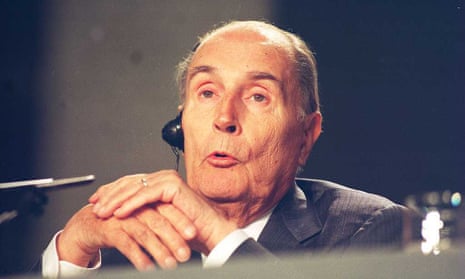A British diplomat raised concerns about the secret extent of French president François Mitterrand’s ill health a decade before the statesman’s terminal prognosis was made public, newly released official papers reveal.
Sir Reginald Hibbert, the UK government’s ambassador in Paris, apprised Whitehall colleagues in December 1981 with “talk about the president’s health which seemed to me to carry a certain amount of conviction”.
He said that while the publication of the president’s six-monthly health certificate “skilfully” gave a “thoroughly reassuring impression”, it left a doubt that “there may be some areas where his health is unsatisfactory”. Hibbert suggested that Mitterrand may have cancer.
His suspicion, revealed now in the latest release of classified Cabinet Office documents by the National Archives in Kew, was well founded.
Mitterrand died in 1996 with prostate cancer – something he had successfully concealed from the French public throughout his presidency and until his death.
He had been in office for less than a year when the UK’s ambassador to France reported back with his suspicions, gleaned from an Élysée Palace insider, who said he had “very reliable reports” on Mitterrand’s health well before took office.
Hibbert wrote: “According to these [reports], Mr Mitterrand was suffering from a form of leukaemia which was controllable within limits by medical treatment and whose effects would be slow to develop.”
He said Mitterrand did not consider his ill-health a barrier to running for the French presidency because he was such a rank outsider for the job.
“When the election suddenly turned in his favour, he was caught and was now bound to put the best possible face on the state of his health,” Hibbert added.
He said Mitterrand recently told television viewers he was “feeling better” after a routine checkup – which led to an accusation by the Élysée source that Mitterrand was “lying to the French people” about the seriousness of his health.
Hibbert also remarked on the president’s “oddness in demeanour”, “remarkably pallid” skin and shortages of breath.
“Paradoxically, I think that the more Mr Mitterrand parades his allegedly clean bill of health, the more one becomes suspicious that there is something wrong with him.”
Mitterrand served as president until 1995, when he was succeeded by Jacques Chirac.
His poor health only became known after his death in 1996, when his former private doctor lifted the lid on his patient.









